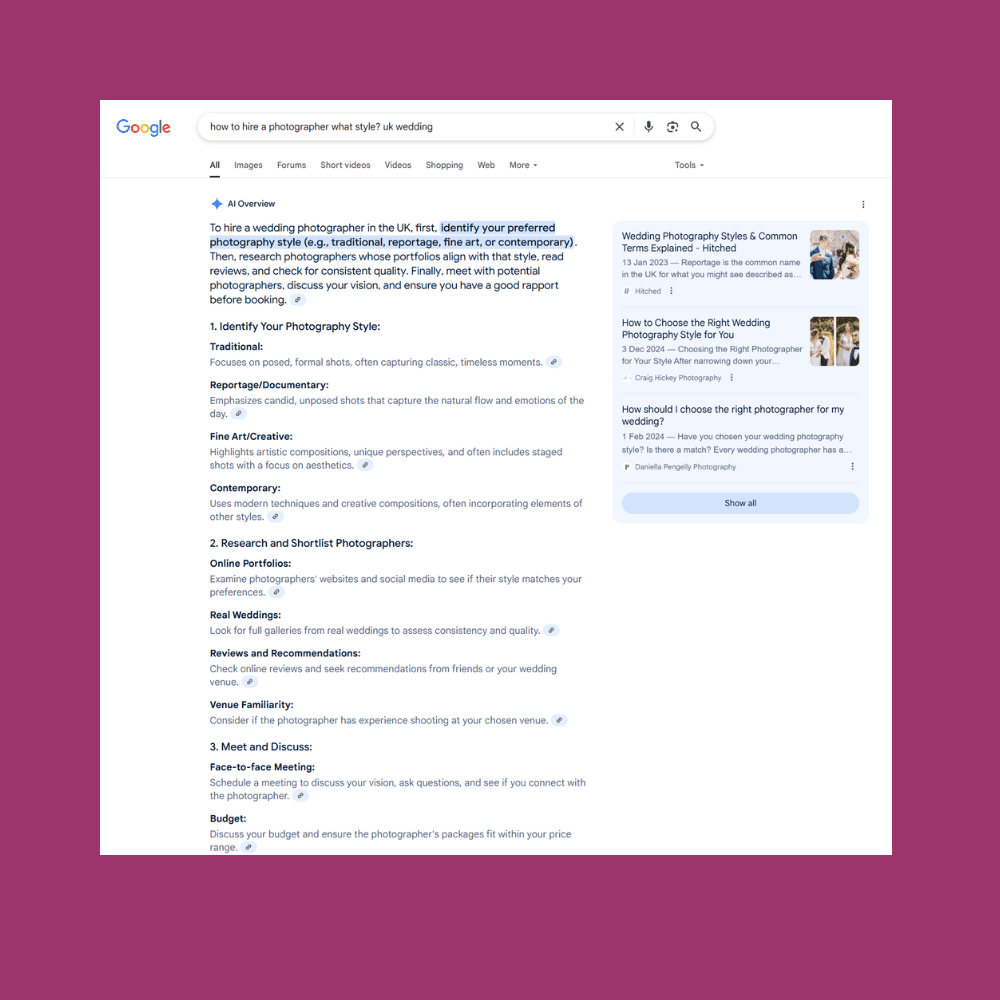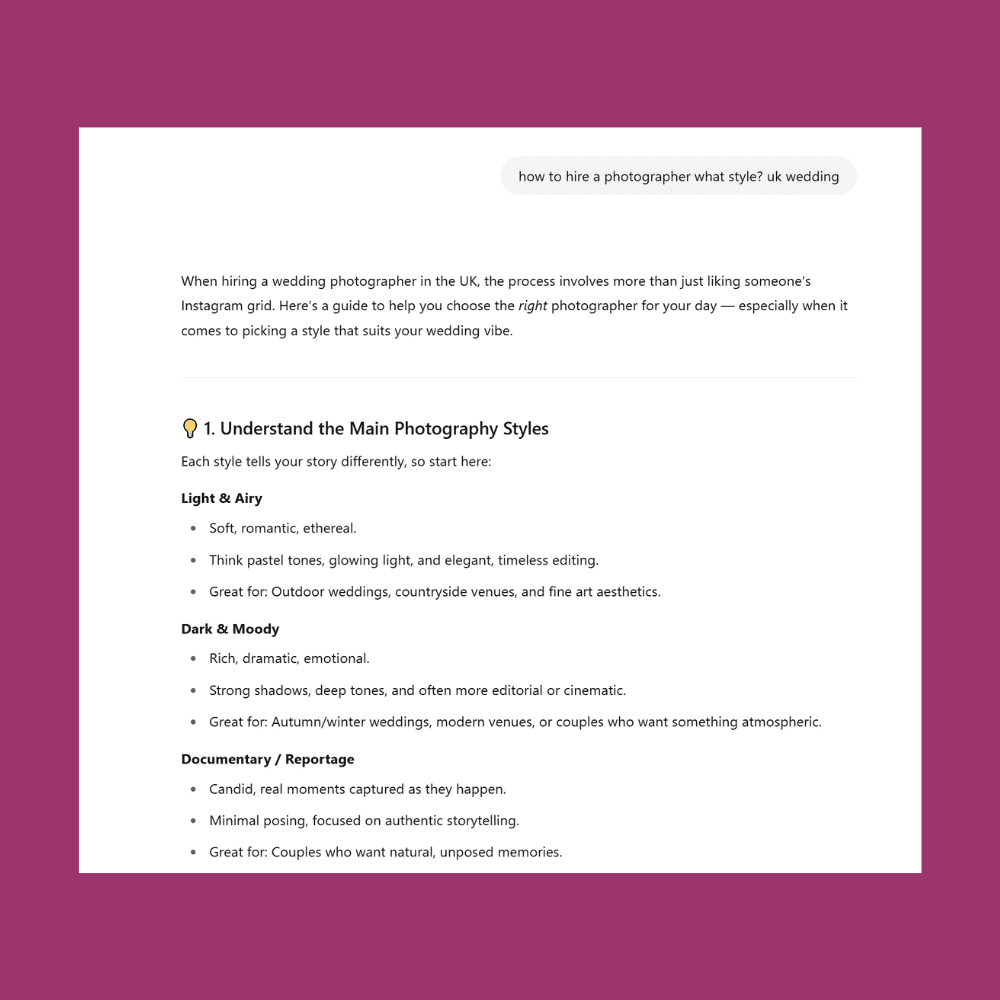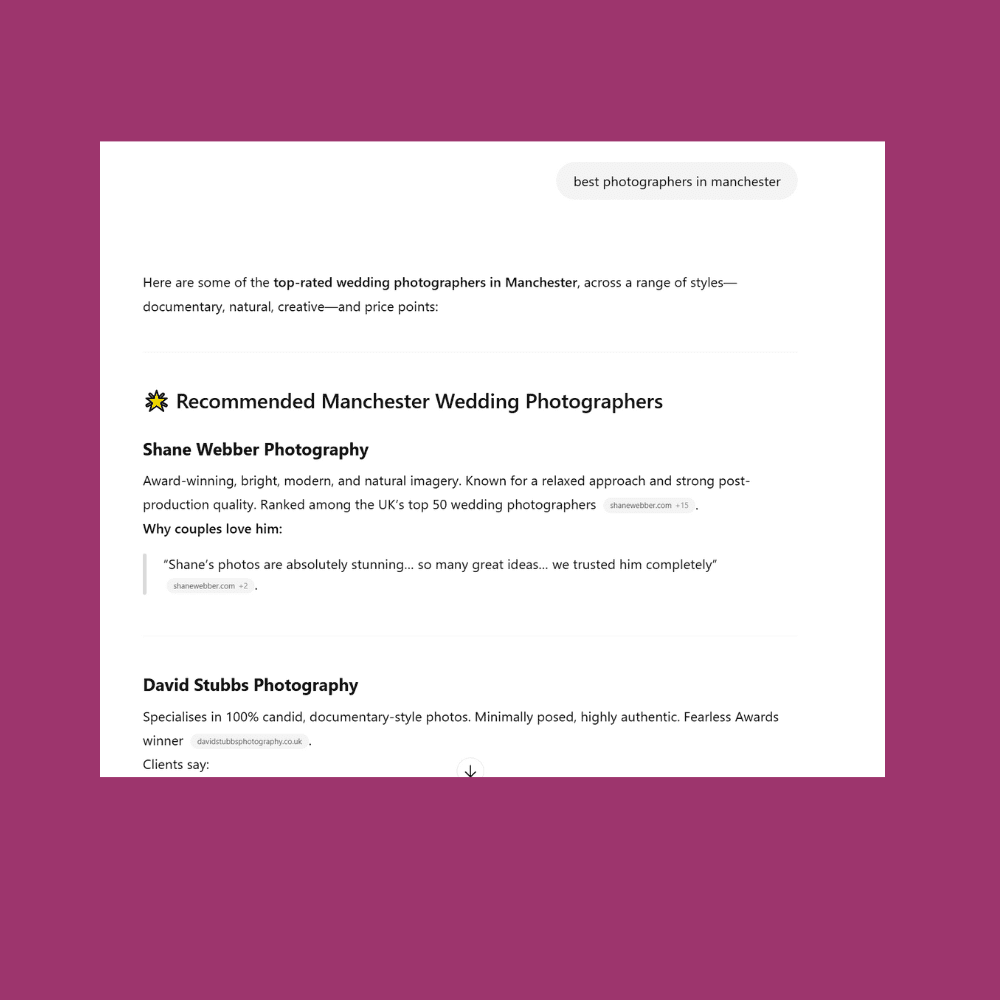Short synopsis:
AI search is changing the way people discover businesses like yours. This blog shares the key steps to help your website copy *and* content show up in AI overviews — like those seen in ChatGPT, Gemini and other LLM-powered tools — so you can stay visible, searchable + relevant as traditional search evolves.
Wait, website traffic from where?!
A jaw-dropping* thing happened the other week.
*Well, if you’re into all things website strategy + SEO, anyway.
I was checking my HotJar analytics (side note: my fave way to actually understand your website user behaviour) and I spotted something exciting: I was getting direct traffic from Gemini and ChatGPT.
Cue my brain: Oh wow, the enemy has become the bestie?!
Only joking — kinda. For ages, everyone (and their dog) was declaring copywriting dead. And then here we are — AI recommending me as the pro website copywriting resource. It felt transparent like ChatGPT and Gemini were saying, “we’re just the messengers… this human is where it’s AT”.
Cheers, gals!
Now, let me be clear: I hadn’t planned for that to happen — I hadn’t written website copy for AI specifically. Of course, SEO is always front of mind (I’m an SEO strategist, it’d be rude not to), but this traffic came from a newly launched page — my website copywriting templates. I had literally just launched it days before. And yet… there it was. Already showing up. Already driving traffic. And optimising my website copy for AI had NOT come into my practice.
So naturally, these sudden AI SEO results got me questioning these few things:
- What had I *actually* done to get featured? (Most important Q!)
- Wow, that was fast. I’ve seen speedy results when I fix a client’s SEO or launch a fully optimised site, but this was one page. A new one. And it ranked.
- That traffic actually converted. 25% of those visitors signed up for my lead magnet. Which means they’re now on my email list, engaged with my brand, and maybe future clients. Big win.
Yep — there were two users from ChatGPT, two from Gemini, and one of them signed up for my freebie.
The SEO strategist in me kicked in immediately.
I needed to understand how I achieved this — not only for my clients, but selfishly for moi (because yes, you should treat your own business like a client!).
So I reverse-engineered it. Looked back at what I’d done. Compared it with the latest Google guidance. And now? I’ve refined my internal SEO strategy (aka what I’m doing to make sure clients rank well on Google) — and I’m sharing it all here, in this post, so you can do it too.
What actually is an “AI Overview” (and what do LLMs have to do with it)?
Before we get started, let’s iron out any doubts with some clear no-nonsense definitions.
Google’s Gemini
You probably have seen an AI Overview when using Google recently. This is when you ask a query, and you get something that looks like this:

As you can see, this snippet gives the user an answer – without them *actually* having to visit a website. What’s cool though is that you can also see a paperclip icon, which is a link to the original source that the AI model has ‘scraped’* the answer from. And you can also see the sources summary on the right hand side… nice!
*Perhaps ‘scraped’ is a little negative in language, but that’s essentially what the LLM has done – and here that’s transparent. So I’m all for it.
I’m not really a Bing girlie (or any other search engine — Google GAL for LYF), but this is basically what works across all search engines now.
ChatGPT
You probably enjoy a bit of ChatGPT every day. I know I do – yes, says the copywriter. It speeds up manual tasks and even helps me send out proposals when custom web copy projects get more complex (this one for Marshawn Evans Daniels had over 25+ pages of copy, for example!). So while ChatGPT is no substitute for actual effective, compelling copy, it’s definitely my go-to assistant right now.

ChatGPT is very similiar to Gemini (Google’s AI assistant). However, links are less common on ChatGPT as you can see below, and it tends to only suggest links when you ask very specific recommendations or specifically ask for sources.

Why do you want to show up in AI Overviews?
Because the way people search is changing — and it’s not going backwards.
You can feel nervous about it (you’re human), but if you want to stay visible online, learning how to work with AI search is the best way forward. No sticking our heads in the sand, okay?
The 4 things I’m doing right now to make sure website content shows up in AI search tools
01. Sticking to really good SEO basics (that still work!), clear website copy + accessibility best practice
The same website copy principles I’ve always championed still apply. Clear page structure, well-tagged headings, thoughtful use of keywords (especially location-based ones), and optimised service pages — these all matter.
Whether someone’s searching for an interior designer in Mayfair, a wedding planner in Orlando, or a Showit website designer for photographers — your copy needs to help them know they’re in the right place.
You can do this by covering the SEO basics:
- Clear page structure and one H1 per page
- Keyword research that aligns with what your clients are actually typing
- Natural use of those keywords in a way that improves the reader experience
- Strategic internal linking and clear metadata
- Specific, relevant location keywords if you work regionally
Website AI optimisation tips — in general:
Of course, I can’t just talk about the words. Copy is a living, breathing part of your website, and works with the design and functionality of your website. So here’s what else matters beyond the literal words…
- Clean navigation
- Clear, readable fonts
- Mobile responsiveness
- Fast loading speeds
“Even the best content can be disappointing if people arrive at a page that’s cluttered, difficult to navigate or makes it hard to find the main information they’re seeking.”
02. Writing web copy for humans (always) — and understanding how they actually search
LLMs might be doing the summarising, but the prompts still come from real humans. Yep, the robots have not yet fully taken over.
That means you still need to understand your ideal clients’ search intent and how they’re phrasing their questions throughout the buying journey — from awareness to decision-making.
Google keeps it simple: “Focus on your visitors and provide them with unique, satisfying content.”
If your website content clearly answers those longer, more specific queries — including follow-ups — then you’re in a great spot to be featured for ‘research mode’ searchers. This is great advice for content wiritg – like blogs!
Optimise your core website copy for AI
But equally important, making sure your core pages (sometimes known as your ‘money’ pages because they’re where you offer what you do + get leads/ make sales) show up is also still very important.
Here are your website copy priorities:
- Strong headlines + subheads
- Clear calls-to-action
- Keyword-aligned sections
- Objection-handling content (like FAQs)
03. Publishing authority website content regularly (and showing your E-E-A-T)
Blogs, case studies, commentary on current trends (like this one!), testimonials — all these demonstrate your expertise and build trust with your audience. And they also make your site more attractive to AI tools looking for reliable sources.
Fresh content gives Google more reasons to keep visiting your site. It’s also how you show you’re active, engaged, and knowledgeable about your industry.
SEO foundations first, please!
But don’t forget to optimise the foundations of your site before even working on this step. This. Is. So. Important. And, this is *exactly* what I do in my SEO fix-up service.
04. Prioritising website copy + content when looking at your marketing overall
And if there’s one thing I’d always tell you: Your website shouldn’t be an afterthought — especially now. As AI tools and LLMs continue to shape how people search, your site needs to be ready to show up and make an impression.
This means prioritising your website as the central hub of your marketing. Not just something you ‘get done’ once and forget about. Keep it updated. Make sure your service pages are strong, your blogs are current, your foundational SEO is solid, your user experience is great, and your content clearly reflects the value you bring.
When you treat your website as the strategic asset it is — with high-quality content, proper structure, and a clear user experience — AI tools can and will take notice. And Google itself says how important this is:
“We’ve seen that when people click to a website from search results pages with AI Overviews, these clicks are higher quality, where users are more likely to spend more time on the site.
“Why is this? Our AI results may give people more context about a topic overall, and display more relevant supporting links, than with classic Search. This may provide a more engaged audience and new opportunities with visitors, but you might not optimize for these if you focus too much on clicks instead of the overall value of your visits from Search. Consider looking at various indicators of conversion on your site, be it sales, signups, a more engaged audience, or information lookups about your business.“
TL;DR?
Don’t just optimise for clicks. Optimise your full experience — from design to copy to navigation — so your site not only gets found, but keeps people there.
In summary, how are we NOW optimising website copy for AI?
Well, let’s take it back a step and look at your website as a whole. And I’ll say this loud and clear:
If your website is genuinely helpful, aligned with how people search, and structured for clarity — you’re already halfway to winning with AI-powered search.
And if terms like “AI” or “LLMs” feel a bit out of reach? Another thing to question? Let me reassure you:
They’re just new tools pointing people towards the same thing: genuinely useful, human-first content. So if you nail the basics, and understand to always put your ideal client first…. yep, you’re winning.
“The underpinnings of what Google has long advised carries across to these new experiences.”
SEO isn’t dead. It’s just shifting. And evolving your website with it in mind is the best thing you can do if you want your website to remain a powerful tool that works hard for your business.
Want your website to show up in AI Overviews (and LLM-powered search tools)?
Here’s how I can help:
→ SEO Fix-Up
Audit + optimise your existing website copy for traditional search and AI models. Includes a tailored 12-month SEO plan.
→ Custom Website Copy
Brand new website copy that connects with humans and impresses Google. Because yes, you can have both.
→ Template + ELEVATE
DIY your website copy with a customised-to-your-biz guided templates + get 1:1 expert copyediting support so your audience loves what you say, as much as Google.
→ Website Copy Templates
Prefer to DIY with a ready-to-go starting point? Head to my template shop for instant downloads packed with AI plug-n-play prompts, guidance + SEO know-how.
Got questions? Reach out here.
I’m here to literally inject some colour into your web copy.
Pop your details here, and receive instant access to my super easy fill-in-the-blanks Canva web copy template. Packed with SEO tips, writing prompts + AI setup guide.
Grab your free mini web copy template w/ AI prompting tips
your kickstart guide to writing your own web copy
Zoe Barnett is a website copywriter, strategist + SEO expert helping founders, thought leaders + ambitious creatives turn their websites into powerful revenue-generating assets. From SEO for maximum visibility to strategic, conversion-focused copy for full website builds, Zoe works with clients across the UK, US, Australia + Europe — all from her base in Cheshire, UK.